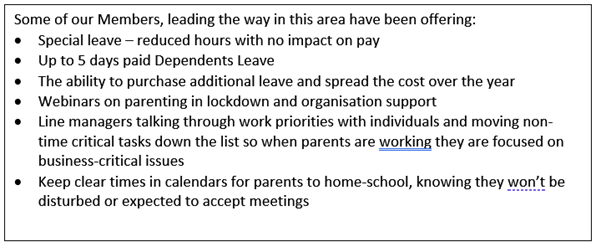Stepping up support for working parents in this latest lockdown period
Claire McCartney’s blog discusses how employers can support working parents, especially during the latest lockdown
Claire McCartney’s blog discusses how employers can support working parents, especially during the latest lockdown
Following the UK Government’s announcement this week of a new lockdown period and the closure of primary and secondary schools, working parents are once again having to grapple with the challenges of balancing work with childcare and home learning for their children.
Data from the first lockdown shows the negative impact of the pandemic on working parents. ONS data on parenting in the lockdown that started in March last year, showed that many parents had to change their work routines around childcare, and that parents were at significant risk of furlough.
Research by Working Families in October 2020, also found that 1 in 5 or 2.6 million working parents in the UK felt that they had been treated less fairly at work because of their childcare responsibilities since the onset of COVID-19.
IFS/UCL research last year showed the impact on working mothers in particular, with mothers being more likely than fathers to have left paid work since February. Among those doing paid work at home, mothers are more likely than fathers to be spending their work hours simultaneously trying to care for children.
In addition, BEIS evidence suggests that discrimination faced by pregnant women and new mothers before the pandemic was high and is likely to be accentuated by the pandemic. Data from a Pregnant Then Screwed survey of almost 20,000 mothers and pregnant women in July this year found that 46% of mothers being made redundant blame a lack of childcare provision during the COVID-19 pandemic.
It is therefore really important that working parents are properly supported through this challenging period to reduce any longer-term negative impacts on their employment, career prospects, and to support gender equality and help organisations retain valuable talent.
Employers must recognise that many parents could be struggling to work due to the latest round of school closures and should have plans in place to support them during this demanding time. We think there are six key areas, where support can be stepped up.

Finally, we are interested in member views on what further support, if any, might be helpful from the Government for parents during this latest lockdown period. For instance, we know that children from poorer households found it harder to do schoolwork in the previous lockdown – the availability of paid leave for parents might make a tangible difference here.
Our findings so far suggest there is most support for parents to have ‘the right to work flexibly’ during this lockdown period (77%), followed by having the right to be put on furlough (46%) and over a third supporting the provision of up to two weeks government funded paid parental leave (36%). Only 7% felt that no extra support should be provided.
The CIPD view is that flexible working practices should be the norm- not the exception -for all UK workers and with that in mind, we are launching a campaign next month, calling on the Government and employers to make the right to request flexible working a day one right for all employees.
Browse our A–Z catalogue of information, guidance and resources covering all aspects of people practice.
Discover our practice guidance and recommendations to tackle bullying and harassment in the workplace.

Claire specialises in the areas of equality, diversity and inclusion, flexible working, resourcing and talent management. She has also conducted research into meaning and trust at work, age diversity, workplace carers and enterprise and has worked on a number of international projects. She is the author of several reports and articles and regularly presents at seminars and conferences.
Review the papers and submissions from the 2023 conference

Research suggests furlough schemes protected men’s mental health better than women’s

Will the leadership lessons learnt help with new challenges?

We look at the main focus areas and share practical examples from organisations who are optimising their HR operating model

Our series on current practices, future models and successful transformations

We look at what’s driving change in HR structures, what emerging models look like and what to consider when evolving your current model

How can L&D teams can engage with new technologies like generative AI to impact performance?